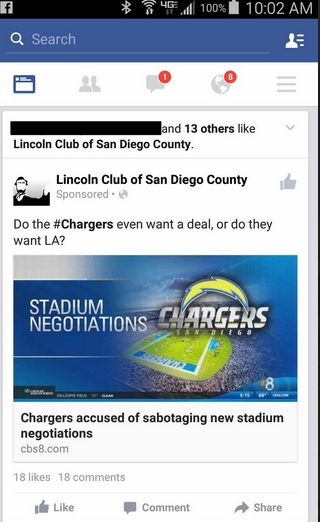On Monday, San Diego Mayor Kevin Faulconer detailed a new timeline he thinks could satisfy the NFL’s deadline for an approved Chargers stadium plan by the end of 2015.
After meeting with Chargers owner Dean Spanos for the second time in less than a week, Falconer said that, should San Diego and the Chargers come to an agreement on the financing and site for a new stadium, the city council could call a special election for mid December, 2015, to ratify the plan.
Keep in mind, the NFL hopes to finalize plans on Los Angeles relocation by the end of the year. That means deciding between the Chargers and Oakland Raiders Carson stadium plan or St. Louis Rams owner Stan Kroenke’s Inglewood stadium or perhaps the three teams working together to come up with a resolution in which everyone comes away satisfied.
Which brings us back to San Diego and the hope of getting a new stadium approved by the end of 2015.
The mayor’s thinking seems to be the typical – and lengthy – California Environmental Quality Act (CEQA) process associated with a project of this magnitude can be circumvented by declaring that the stadium is “categorically exempt” from CEQA. Essentially, this means the City will argue that CEQA does not apply to the new stadium because it is simply replacing the old stadium.
It sounds interesting, but there are legitimate concerns that taking this route might leave the project vulnerable to lengthy court battles. If so, the NFL’s 2015 deadline will come and go and the Chargers may end up with no stadium plan in San Diego and no fallback plan in Los Angeles.
In other words, risky business.
Without boring you with too many of the details, the primary concern is that “categorical exemptions” disappear whenever you can show that a project will have “unusual environmental impacts.”
And what sort of unusual environmental impacts might be associated with building an NFL stadium?
Truck traffic in the surrounding neighborhoods during construction. Parking and congestion impacts in the surrounding neighborhoods when, for the three years of construction, more than a third of the existing parking lot will be unavailable. Dewatering impacts, which means that during construction water will be used to compact soil and for other purposes, which means that the water will sink into the existing toxic plume under the site, disturbing the plume.
And with the new stadium being on a different part of the site than the existing stadium, it will be closer to homes and a fuel tank farm. That means noise, light, traffic and potential safety concerns.
Long story short, it’s not hard to imagine someone stepping forward with any or all of these concerns and challenging the projects “categorical exemptions” status with a lawsuit.
And keep in mind, all of this is still contingent on San Diego and the Chargers brokering a satisfactory financing plan.
As you can see, between the financing concerns and the strong potential for lawsuits, it would be a tremendous leap of faith on the Chargers and NFL part to sign off on such a plan.
So my question is, rather than foolishly cutting corners and leaving the plan dangerously vulnerable – just to meet a deadline – why doesn’t San Diego petition the NFL to give the city an extra year to work on this?
That would mean doing a proper EIR and complying fully with CEQA.
And having a November 2016 election – even if it means one that will ask San Diego city and county residents to approve a tourist tax such as a hotel tax, or car rental tax, to try to generate new revenues to pay for the project?
The bottom line, buy more time to get this right.
After doing some poking around this morning, this is what San Diego needs to show to possibly slow this train down a bit:
1. Show real progress and actions that proves the effort is serious.
2. Create a project that interests the team.
But there are provisions.
1. There needs to be a clear recognition that a failure would probably result in the team moving. In other words, no third chances.
2. A Los Angeles site with one team is put in place, with a clear path for a second team to join in one year.
It might not be the perfect solution for everyone involved – and for sure the Chargers will have to think long and hard about losing leverage in Los Angeles and negotiating power to deal with Stan Kroenke.
But if you are San Diego isn’t it worth a shot?

